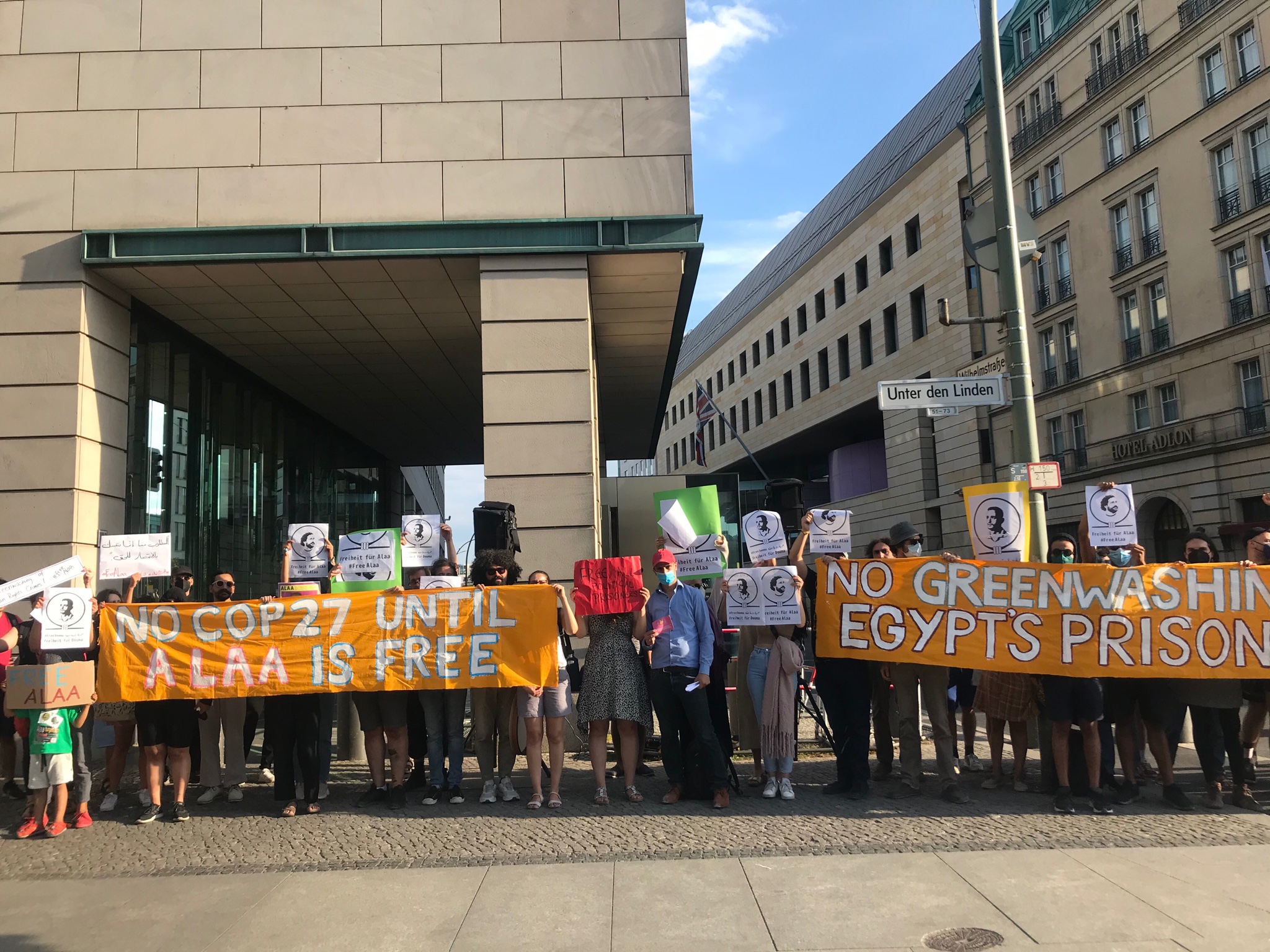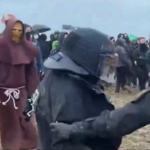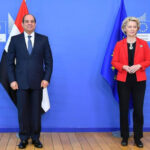Egyptians in exile are currently protesting for the release of blogger and democracy activist Alaa Abd el-Fattah. A Berlin based solidarity group has also criticised Germany, which is an important trading partner of the regime in Cairo and wants to import “green energy”.
The Egyptian activist and blogger Alaa Abd el-Fattah is considered one of the faces of the 2011 revolution, but the government keeps imprisoning him. He has been on hunger strike since 2 April, eating only 100 calories a day. Alaa also has British citizenship, so his supporters are protesting in front of British consulates and embassies. The new solidarity group OccupyCOP27 from Berlin responds about this.
M.M.: You have already organised several rallies in Berlin and also protested during the visit of Egypt’s President Abd al-Fattah as-Sisi. What is this all about?
OccupyCOP27: Following the coup of July 2013 the regime of Abdelfattah as-Sisi has created a more oppressive totalitarian environment in Egypt than what existed before the January 25 Revolution. That regime has build 27 new prisons and as of 2016 over 65,000 political prisoners are being held there, alongisde countless others who are ever so rarely given a fair legal process. This of course is something that is very difficult to monitor as even journalists and human rights activists who are only doing their jobs do so at huge risk to their lives in Egypt.
There are countless cases of these being arrested for trumped up charges, being forcefully disappeared and the worst their liefeless bodies appearing in some hospital ward with torture marks. This regime has no limits. And yet, the so-called democratic world embraces it with open arms. For a short while, the EU for example had some hesitation following the brutal rise to power of as-Sisis in 2013 and the massacre of over 1.000 supporters of the ousted president Mohammad Morsy. Yet, that hesitation quickly faded to the background as the benfits of such a military dictatorship have become more apparant.
What are they, for European governments?
Egypt plays a central role in keeping refugees out of Fortress Europe. The treatment given to Egyptian dissidents is often received by migrants passing through Egypt, imprisonment, torture and murder are common practice towards BIPOC migrants with no right to speak of in Egypt. Meanwhile European representatives like Germany’s Minister of Defense Christine Lambrecht recently lauded Egypt’s efforts in hosting 6 million refugees.
You also stood in front of the Chancellor’s Office in Berlin, probably because of German-Egyptian relations? How important is Egypt for the German government?
Germany in particular has embraced the trade deals carried out by Egypt’s autocratic leader. As-Sisi has twice broken Siemen’s record of making the biggest sale in the company’s history. Once €7 billion for turbines for three massive non-green gas turbines in 2015 and in recent months €8 billion for completely redoing Egypt’s rail system. In 2021, Merkel’s government, which all will remember included then Minister of Finance Olaf Scholz, signed a deal worth EUR 4,91 bill of weapons sales to Egypt, Germany’s biggest single weapons deal in history and one of many since as-Sisi came to power.
All these purchases are being made by a government, which locks up or exiles true opposition. For these sales the government is making excessive loans including from Germany and thus driving their population deeper into poverty for generations to come. In the next 12 months alone, Egypt needs to service $30bill of loans of a forein loan bill of €158billion, which has trippled since as-Sisi came to power. Germany is a complicit partner in all this, 1. speaking out against the human rights attrocities of Sisi’s regime without acting on it, 2. ignoring the police state’s abuses while benefitting from trade deals made on loans by an undisputed dictatorship. Germany is complicit in all of this.
Alaa has been imprisoned several times, the first time in 2006. What are the charges?
Being an outspoken activist, and one who is always able to clearly articulate visions for a socially and economically just future in Egypt, has attracted every regime’s attention and fear of Alaa, and as a result his imprisonement under Mubarak, the Supreme Council of armed forces in 2011, Sisi in 2013, and again in 2019. In each of these situations the charges against Alaa were falsified and were based on his inspiring solidarity with existing mvoements, people and events. In 2006 Alaa was arrested with many other bloggers and journalists who came out to the streets to support Egyptian Judges calling for their independance after witnessing fraudulent elections.
In 2011, Alaa was arrested after a bloody sectarian massacre by the Egyptian military of peaceful protestors in what became known as the Maspero Massacre. After the event authorities accused many protestors of attacking the military (some of whom were killed and trampled on by military vehicles) in an attempt to deflect media attention off what really happened. Alaa spoke out against what happened in Maspero and was consequently charged of stealing a military vehicle and damaging it, only to be let out towards the end of the year. In 2013 Alaa’s home was raided by masked special service officers, after which he was tried and sentenced to 5 years in Februrary of 2015, for taking part in a protest against a newly ammended constitution – at a time when peaceful protests were being outlawed by the Egyptian regime.
After he served his five years, he emerged from prison in March of 2019 only to find himself under probation, required to spend 12 hours of his day in a detention space inside a police station. Despite this situation Alaa devoted his time to his son, whom he had missed for five years, and rebuilding his life, relationships and his writing. He had many ideas of initiatives that could be done with young people who emerged from prison sentences, politicized, dazed, and ready to raise questions about abolitionism. In September 2019, while serving his parole, Alaa was kidnapped from his detention space and dissappeared before reappearing again in the hands of the National Security. He was kept under temporary detention without a reason being anounced and once again tried and sentenced only in December 2021, for sharing a facebook post about news of a prisoner who was tortured to death.
According to the latest sentence handed down by Egypt’s State Security Court, which carries a five-year prison sentence, he is alleged to have spread false news…
The charge against Alaa of “spreading false news,” is a charge that is being widely used to imprison journalists, academics, bloggers, researchers, students, and anyone whose business it is to research and represent facts about any reality in Egypt. This has included journalists writing about the corona situation, post-graduate students researching abortion, human rights activists documenting displacement of communities due to military infrastrcutural projects, and writing about the situations in prisons. The reason for the arrest, or the exact incident that has been determined as “false news” is often not indicated.
Where is Alaa currently held and what is known about his prison conditions? Is he allowed to receive visits?
Since September 2019, he was not allowed books, visitations took place only behind a glass wall so that he could not touch his family, he has had no access to the sun or fresh air, and periodically he has been denied access to letters and visitations. Alaa started a hunger strike in April 2022 in order to demand his basic rights – a visit from the British consulate, books to read and access to fresh air and the sun outside of his cell.
What would the visit to the British Consulate help with?
Alaa is currently serving a five year sentence (since December 2021, despite being in detainment since September 2019). During this period it was disocvered that he and his siblings were entitlted to British citizenship since his mother Laila Soueif was born and lived in England. Since receiving his British passport in December 2021, Alaa has requested consular visits and the UK has requested his release to no avail. Alaa’s prison conditions this time were worse than any other.
Could public pressure also help him to be pardoned?
Like many prisoners who have received a sentence, Alaa is eligible for presidential pardon, but this pardon is always arbitrary and there is no telling of who gets it and when. Despite a current “national dialogue” between the regime and politicians and international campaigns for the release of at least 65,000 political detainees, only a handful of prisoners are released per month.
How does Alaa manage to communicate with his family and supporters through the prison walls?
At the beginning of his hunger strike in April 2022, Alaa demanded that his letters be released to his family, that he be allowed books to read, and time outside of his cell known as “excercise time.” In May 2022 in response to the international solidarity with his hunger strike and the mobilization of politicians, Alaa was moved to Wadi al-Natrun prison complex, which, despite its distance from Cairo, has less reports of torture and inhumane conditions.
Weeks before his transfer he was handcuffed and beaten by a police officer who had a personal vendetta against Alaa – he is the officer who tortured and murdered the prisoner whom Alaa had written about and is consequntially in prison for. Once Alaa was transferred he was also allowed more letters, books, and access to an openair corridor. Though the corridor is still shielded from the sun, he is allowed out of his cell which is a step.
And how does the regime react to his hunger strike?
Alaa’s hungerstrike is denied by Egyptian authorities and national media, they claim that he is eating and drinking and accordingly refuse to monitor his health, blood pressure, weight loss or minerals in violation of prison laws. In light of this and after over 145 days of hunger strike, Alaa’s demands have changed. He has declared to his family that “there is no hope in individual salvation” and as prisoners they must think of their conditions as a collective, since the long arm of the military regime spares no one, and people are kept in detainment under illegal conditions and sometimes without charges. This is part of Alaa’s belief that he may not make it out of prison alive, so he uses what voice his hungerstrike has given him to fight for the rights of fellow prisoners in what time he has left.
Alaa Abdelfattah, as a prominent intellectual and inspiring writer has been seen as a great threat to every recent Egyptian government, including and since Mubarak’s 30 year reign in Egypt. His hope is contagious and he reminds that the purpose of tyranny is to stop the root of our struggle and resistance, that is in his words; the scope to love life and fight for it; the production of meaning behind life and struggle, and solidarity across ideological and national borders.
What exactly are his demands in the hunger strike? As you say, it is also about repression in Egypt in general…
His demands now are the following:
– Release all those who are imprisoned within National Security prisons
– Release those who have exceeded their legal pretrial detention period (Many prisoners in Egypt suffer under this endless renewal of their 15 day pre-trial detention, spending years in detention without being subjected to charges or seeing a judge).
– To release all those who have been sentenced unconstitutionally (according to the new constitution) like those charged under emergency courts.
– The pardon or conditional relase for all those convicted in cases where there is no victim.
Many of you have been affected by repression yourselves, the regime in Cairo even persecutes Egyptian nationals in exile abroad…
There is quite a large community of Egyptians in some form of exile living in Berlin. Some actually had to flee, others are not allowed to return, others are concerned that they would be arrested in Egypt due to their political activities.
What more is known about the governmental crimes, and how can these reports be verified?
There are so many governmental crimes that cannot be proven. When Gulio Regeni disappeared on 25 January 2016, many people near to him were afraid for the worst, but only when his lifeless body appeared on a roadside beaten, bruised and tortured did we know what had happened to him. The kidnapping of people is common place in Egypt, leaving bodies – dead or alive – on a far away roadside is also common practice by the Egyptian security forces. Since that time Italian investigators have pinpointed three men in the Egyptian security forces who were responsible for the torture and killing of the Italian student. This is once case that had some powerful people’s attention. Most similar cases remain completely unknown. During the recent interrogation of one of our group, we learned from a lawyer that until the summer of 2021, about a 100 people appear daily before the state security courts, before they are disappeared into its labyrniths.
The numbers cited by many human rights organization are dated because many of the local organizations have come under huge threat in recent years, have moved to other countries or significantly downsized the work that they do. Further, this regime has proven to lie and cover up facts whenever these don’t suit them. Alaa Abdelfattah’s case is again a case in point, and one that is highlighted more than any other in Egypt. After much pressure from Alaa’s family to do so, the state prosecutor sent an inquiry to his prison conditions and found them contrary to everything he and his family have been saying for the past years: everything was in its place, he had books, received plenty of sunlight and countess family visits. In a country where all media outlets are owned by the military, Ministry of Interior or their subsidiaries, indepdent organizations and activists are intimidated, arrested or disappeared, exact statistics are hard to come by. But it’s not about exact quantity of the opression, it is against the opression as such that we struggle.
How comes that you are linking your protest to the World Climate Summit COP 27, which is taking place in Egypt in November?
The Climate Crisis is a crisis of a global scale. In light of the local state terror we have been dealing with in Egypt in recent years it has been difficult to also focus on this global struggle, but it is not possible to seperate the two from each other. After all it is the same military dictatorship that acts in the name of the Egyptian people that has been introducing coal into industry since 2014, is expanding its fossil fuel extraction, while this very month beginning construction of a nuclear power plant on the shores of the Mediterranean. These are not just a problem for the people of Egypt, they are a problem for the world. Further, when this military state is proposed to host a world-wide UN meeting on climate, it shows that there is something deeply wrong with the world. This decision in and of itself is only a new form of neo-colonialism. One in which the rich nations of the world will be falling over each other to make deals with Egypt’s potential green energy infrastructure.
You call for the United Nations not to fall for Egyptian greenwashing. What do you mean by that?
There is plenty of sun, wind and water to gain energy from in Egypt. And yet, there are two problems. 1. already clearly highlighted above, these countries will be not only ignoring the brutal crimes of this military regime by participating and trading with the Egyptian government, they will be greenwashing these crimes, by celebrating Egypt as a climate conscious state, all attendees will be making those crimes even less visible. 2. While Egypt certainly wants to attract green investments, the fact is that local energy is by and large dirty energy. If green energy is going to be produced in Egypt, the only clean way to do so would be to make it available for local industry and consumtion, to shut down coal plants, roll back dirty gas extraction and put an end to Egypt’s new nuclear power plant – being built with Russian technology and loans.
Let’s go back to Alaa. How can he be supported personally?
As we know, letters of solidarity to prison are a very good idea, because prisoners often feel forgotten by the world. Letters can be sent to letterstothoseinside@riseup.net and a campaign will ensure that they are delivered to him.
Image: Solidarity action at the British embassy (Salma Said/ Twitter).





Leave a Reply